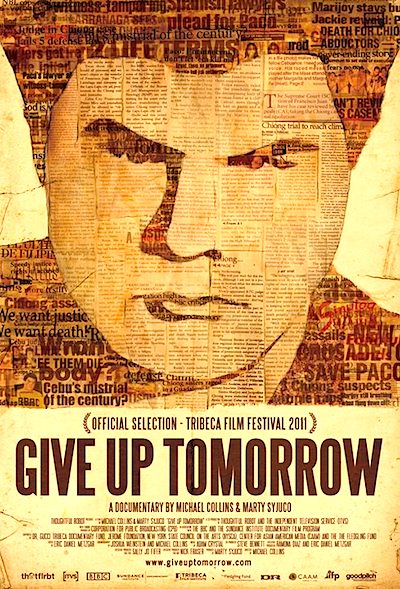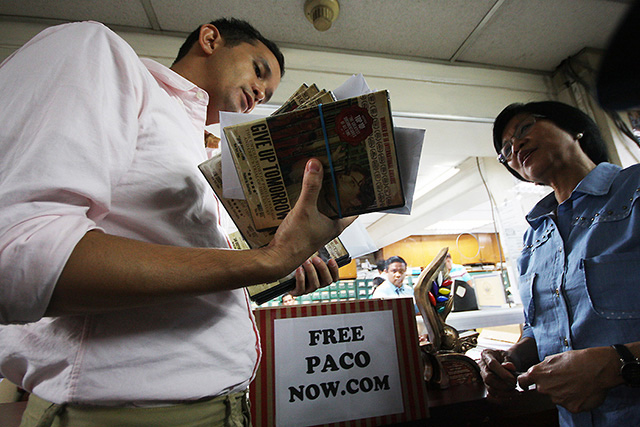Filtered By: Showbiz
Showbiz
'Give Up Tomorrow' docu on Cebu convict nominated for Emmy Award
“Give Up Tomorrow,” the award-winning documentary by Michael Collins and Marty Syjuco about the conviction of prominent Spanish-Filipino Francisco Juan "Paco" Larrañaga for kidnap and murder, has been nominated in the best long form investigative journalism category of the 34th Annual News and Documentary Emmy Awards in the United States.
The film, which premiered in the Philippines during the Cinemalaya Film Festival in July 2012, focuses on the arrest, trial and imprisonment of Larrañaga, a great-grandson of the late President Sergio Osmeña Sr. and a scion of the prominent Osmeña family. 

A Cebu court in 1999 convicted the Osmeña heir and six other men for the gruesome murder of Chinese-Filipino sisters Jacqueline and Marijoy Chiong in 1997 and sentenced them to life imprisonment. Larrañaga was 19 when he was arrested.
The National Academy of Television Arts & Sciences (NATAS) released the list of nominees for the News and Documentary Emmy Awards on July 11.
The winners will be announced in a ceremony at the Frederick P. Rose Hall in New York on October 1.
“Give Up Tomorrow” has won more than 15 accolades around the world—including the Audience Award at the Tribeca Film Festival in 2011—and earned rave reviews from the New York Times and The Guardian newspaper.
In an interview for the pop culture website Spot.ph, Syjuco, who is related by marriage to Larrañaga, said the Supreme Court’s 2004 decision to impose the death penalty on the Osmeña heir stunned him “beyond belief” and prompted him to make the documentary.
The death sentence was later changed to life imprisonment because then-President Gloria Macapagal-Arroyo abolished the death penalty in the Philippines in 2006.
The death sentence was later changed to life imprisonment because then-President Gloria Macapagal-Arroyo abolished the death penalty in the Philippines in 2006.
The Department of Justice (DOJ) in 2009 agreed to transfer Larrañaga to a Spanish prison in keeping with a treaty signed by the Philippines with Spain that allows foreign prisoners to serve out the rest of their sentences in their countries of nationality. His co-accused remain jailed at the New Bilibid Prison in Muntinlupa City.
Syjuco said he and Collins spent seven years making the film, which presents a sympathetic view of Larrañaga.
He clarified, however, that his ultimate goal in filming it was to compel viewers to “examine the Philippine justice system and media and see the cracks where the innocent fall through.”


Filmmaker Marty Syjuco hands over his 'Ani ng Dangal' award and copies of his documentary to a representative from the Board of Pardons and Parole in Quezon City on March 15, 2013. Asti Flores
Earlier this year, Syjuco went to the Board of Pardons and Parole (BPP) to give up the Ani ng Dangal award given to him by the National Commission for Culture and the Arts (NCCA) because the government denied Larrañaga’s petition for pardon.
In an interview with reporters at the BPP office, Syjuco said: "The Board of Pardons and Parole recently denied Paco's petition for pardon so I cannot in all good conscience keep this award. The Philippine government presented it to us for bringing honor to the country and yet they do the most dishonorable thing like continuing to perpetuate the injustice.”
"I find it unacceptable. I cannot, in all good conscience, accept this award because it was given by the same government that denied Paco's pardon, it doesn't make any sense to me," he added.
The United Nations Human Rights Commission ruled in 2006 that Larrañaga had been denied due process and cited multiple major flaws in the case against him.
On July 6, 2013, the Spanish daily Noticias de Gipuzkoa reported that Spain’s Cabinet gave the green light to the joint proposal made by the Ministers of Foreign Affairs and Justice to seek pardon for 35-year old Larrañaga after "having taken into account the efforts for rehabilitation and social reintegration of the prisoner, and prison classification prisoner's family support.” —Xianne Arcangel/KG/HS, GMA News
More Videos
Most Popular



